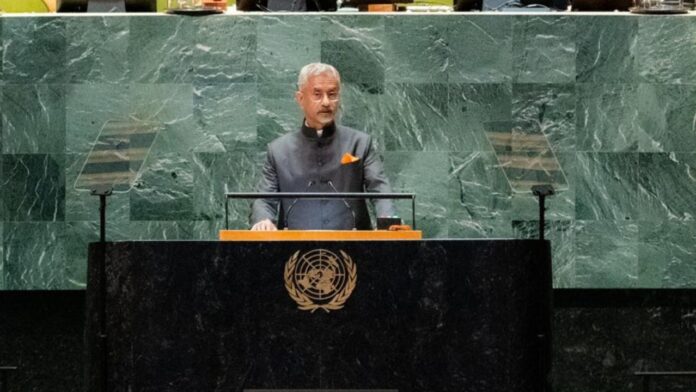New York: External Affairs Minister S. Jaishankar underscored the importance of an inclusive global approach while addressing key issues, stressing the need for a United Nations that is effective, efficient, and representative. Speaking at the 79th session of the UN General Assembly (UNGA) in New York on Saturday, Jaishankar highlighted the changing dynamics of the world and the necessity for a UN that adapts to contemporary challenges.

“The global order is inherently pluralistic and diverse. The UN began with 51 members; we are now 193. The world has changed profoundly and so have its concerns and opportunities,” Jaishankar remarked. He emphasized that the UN must evolve to maintain its relevance, stating, “Large parts of the world cannot be left behind when it comes to deciding the key issues of our times. An effective and efficient UN, a more representative UN, and a UN fit for purpose in the contemporary era is essential.”
The minister also called for greater global cooperation, stressing that collective action is the key to transformation. “Let us send out a clear message from this UNGA session: we are determined not to be left behind. By coming together, sharing experiences, pooling resources, and strengthening our resolve, we can change the world for the better,” he said.
Jaishankar particularly highlighted the concerns of the Global South, noting the setback in development goals. He pointed out, “Across the Global South, development plans have gone off the rails, and SDG targets are receding.” The minister attributed these challenges to multiple global crises, including the ongoing COVID-19 pandemic, the war in Ukraine, and the conflict in Gaza, which he said has “acquiring wider ramifications.”
He further elaborated on the threats facing the region, such as unfair trade practices, climate events, and food security concerns. “Unfair trade practices threaten jobs, just as unviable projects raise debt levels,” Jaishankar said. He also noted the growing anxiety around technological advancements, climate change, and health security, all of which are destabilizing the development trajectories of several countries.
Asserting India’s commitment to addressing these concerns, Jaishankar outlined several measures that India has taken. “First, by focusing on the issues of the vulnerable—women, farmers, and youth. Targeted policies such as assured access to piped water, electricity, cooking gas, and new homes are changing millions of lives,” he said. He also highlighted India’s progress in closing the gender gap in health, education, and the workplace.
On the economic front, Jaishankar pointed to India’s success in fostering employment and entrepreneurship. “495 million Mudra loans have been given to small businesses in the last decade, 67% of which went to women. Additionally, 6.56 million street vendors have availed 8.85 million Svanidhi loans in the last four years, with 45% of the beneficiaries being women.”
The minister also emphasized India’s commitment to replicable governance models that could benefit other nations. “This could be in digital delivery, enhancing the quality of governance, or improving public services. We are also focused on making medicines and health facilities accessible and affordable.”
In closing, Jaishankar reiterated India’s support for the Global South, encouraging collective action to address shared concerns. “We have convened three Global South Summits, the most recent in August 2024,” he noted, adding that India’s contributions to global well-being include projects in 78 nations and responses to humanitarian crises, maritime safety, and security issues.
Jaishankar’s address at the UNGA reflects India’s growing role in global governance and its call for a more inclusive and responsive United Nations.




